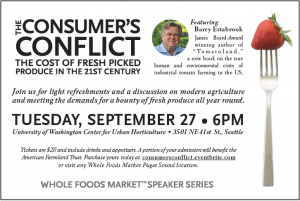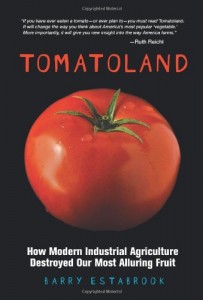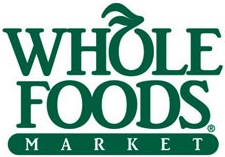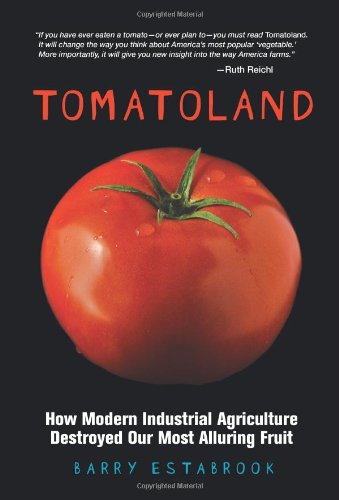 Tuesday night, 9/27, we attended one of Whole Foods Market™ Speaker Series events; this one titled “Consumer’s Conflict: The Cost of Fresh Picked Produce in the 21st Century.” The guest speaker was Barry Estabrook, author of Tomatoland – How Modern Industrial Agriculture Destroyed Our Most Alluring Fruit.
Tuesday night, 9/27, we attended one of Whole Foods Market™ Speaker Series events; this one titled “Consumer’s Conflict: The Cost of Fresh Picked Produce in the 21st Century.” The guest speaker was Barry Estabrook, author of Tomatoland – How Modern Industrial Agriculture Destroyed Our Most Alluring Fruit.
Wow! We signed up, entered the credit card number to be charged $20 each to attend, and looked forward with interest.
The good news: there was a big crowd, nice munchies, wine and cider. We met a number of “good food folks” and connected with old friends.
The bad news: we paid $40 to attend what was in essence a Whole Foods Lovefest with very little substance to the conversation. And Estabrook was relegated to being one of a panel responding to some softball questions lobbed by Bellamy Pailthorp, environment reporter for KPLU, a local radio station. Twelve years at KPLU following 8 years in Berlin Germany freelancing for NPR should have sharpened her pen, but she didn’t show it.
The line-up included Estabrook, Lisa Nakamura (chef/owner of Allium restaurant on Orcas Island), Jeff Miller (farmer/owner of Willie Green’s Organic Farm outside Monroe WA), and Edmund La Macchia (VP of Procurement-Perishables for Whole Foods Market).
 Estabrook reminded us that Florida is uniquely unqualified when it comes to growing tomatoes. The weather is too humid – tomatoes do NOT like humidity, as we can attest here in Seattle – and the soil is sand, almost pure sand. The only reason tomatoes are grown there is that winters are warm enough to grow them and it is possible to easily deliver them to two-thirds of the United States – the cold two-thirds!
Estabrook reminded us that Florida is uniquely unqualified when it comes to growing tomatoes. The weather is too humid – tomatoes do NOT like humidity, as we can attest here in Seattle – and the soil is sand, almost pure sand. The only reason tomatoes are grown there is that winters are warm enough to grow them and it is possible to easily deliver them to two-thirds of the United States – the cold two-thirds!
The end result has been pricing pressure forcing the prices down more and more, resulting in sub-poverty level wages and near slavery for the seasonal workers.
Nakamura opened Allium in spring of 2010 on Orcas Island, which lies just about halfway on a straight line from Victoria, BC, to Bellingham, WA. Buying local is not being a locavore, she says, “I buy local ingredients because I want to support my neighbors who grow, forage or procure these foods. I want to look my supplier in the eye.”
Lisa prefers to buy direct from island providers, who have often harvested their products just hours before she receives them. As the seasons change, she will expand her sourcing to include the rest of Washington, Oregon, and northern California.
Miller was once a chef as well. Established in 1987, Willie Green’s started small – just a quarter of an acre – but has grown to 55 acres of vegetables and berries. Jeff is committed to providing the freshest, organic and seasonally grown produce.
La Macchia worked in the late 70s for the legendary Mifflin Street Co-op in Madison Wisconsin. As he put it, “Well, maybe not worked, but I did go in and goof around a lot.”
Rather than talking about the true cost of fresh picked produce – including the issues of worker rights and “industrial organic” production – most of the discussion focused on buying local and seasonal products.
Seasonal is not a concept that is difficult to define, but local has proved to be tougher. Whole Foods offers a full range of fruits and vegetables year-round from what’s “in season” in other locations. The company’s definition of “local” is 8 hours or less to the facility that accepts the products or within the state of consumption.
What should consumers think about when buying fresh produce?
- As parents, you are making the choices for your family; you want to give them the best.
- There is a face behind the fruits and vegetables, but it’s not just a farmer, there are also produce workers, pickers, processors, and cooks.
- Produce is the ultimate health food, so we all need to become food literate.
 A particularly pointed question from the audience asked, “How do we provide access to good food for all?” Whole Foods has occasionally been labeled “Whole Paycheck” because of the high cost of the products sold there.
A particularly pointed question from the audience asked, “How do we provide access to good food for all?” Whole Foods has occasionally been labeled “Whole Paycheck” because of the high cost of the products sold there.
While most of the members of the panel focused on charity – from food banks to gleaning – Estabrook was the only one who clearly addressed the equity and worker welfare issues.
A micro-producer – a farmer with an urban farm on a single acre – asked about economies of scale for small producers. Will we only be able to get our food from larger and larger producers, whether commercial or industrial organic? Miller, whose farm is comprised of more than 50 acres, responded that he feels the need to continue to expand and grow in order to efficiently deliver products to retailers like Whole Foods.
An additional comment from the audience noted that we do need to continue to address the equity issue. Food has become a commodity in the US since World War II and it is the bankers who are determining the prices rather than the farmers. If we include the true costs of energy, transportation, and the fair cost of labor and we eliminate artificial subsidies and undeserved payments to stockholders, conventionally produced food will no longer have a price advantage. Good food will be affordable to everyone.
The discussion and the audience questions lasted nearly an hour and a half, yet the group barely touched on worker rights, food security, and access to good food by low-income consumers – issues that also make up the true cost of fresh produce. Tomatoland clearly shows that the lack of equity in the system is very much connected to the low cost of industrial food.
We felt like we had been victims of a sophisticated “bait and switch.” There was too much Whole Foods and too little discussion of the real cost of fresh produce and what to do about it. And we paid $40 to hear it…
Watch for an upcoming interviews with Barry Estabrook, Jeff Miller, and Lisa Nakamura for the rest of the story.


Hi Gail,
Thank you for your candid feedback on Tuesday’s panel. The goal with these events is to create a forum for open and authentic dialog around some of the most important food issues today. This is a new initiative for us, so we welcome comments and critique that will help make future events stronger. I’ll send you an email soon and I look forward to continuing the conversation.
Denise Breyley
Pacific Northwest Local Forager
Denise,
Looking forward to the next one; like all new projects, they evolve reflecting the audience and the subject.
We really enjoyed meeting the panelists and will continue the dialog with all of them on GoodFood World.
Enjoy your foraging – what a great job!
Gail N-K